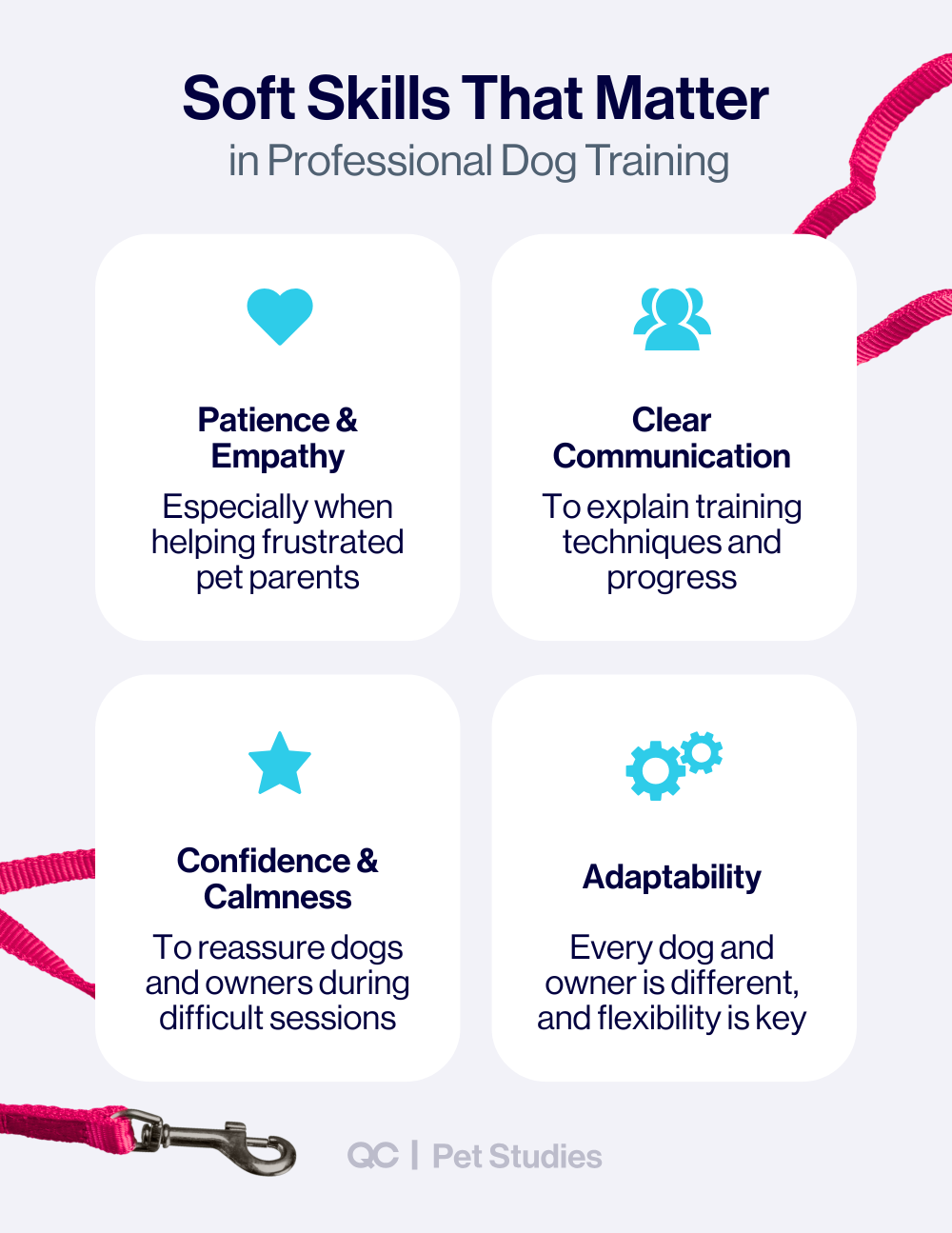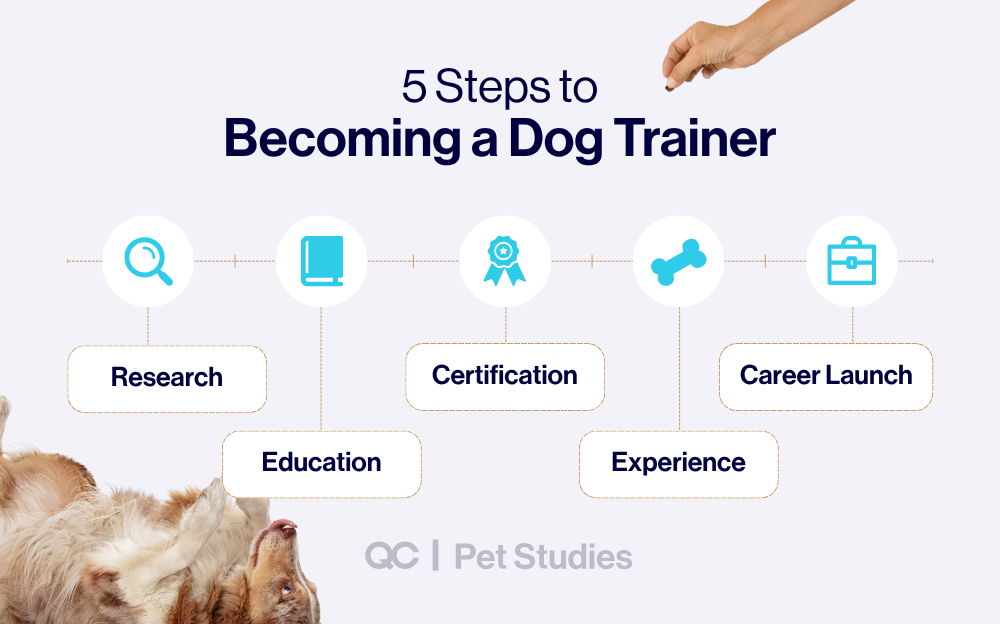How To Become a Dog Trainer Key Points
- Certification builds trust and credibility, even though it’s not required.
- QC Pet Studies offers flexible, self-paced online certification with expert feedback.
- Most students complete certification in 3–6 months based on their schedule.
- Career paths include training facilities, your own business, or specialization.
- QC stands out from competitors by offering mentorship and real-world practice.
Introduction
If you love dogs and want to turn that passion into a rewarding career, becoming a dog trainer might be the perfect fit. Whether you’re starting fresh or switching careers, there are clear steps you can follow to get certified, gain hands-on experience, and start helping dogs (and their humans) live better lives.
👉 Keep reading to learn how to become a certified dog trainer — and why your journey starts with the right education!
Firstly, understanding what dog trainers do is essential before starting your career path! After all, their work goes beyond simple commands. It’s about shaping behavior, improving communication, and enhancing the human-dog bond.
Core Responsibilities of a Dog Trainer
Dog trainers focus on teaching dogs to behave appropriately in various environments and scenarios. Their primary tasks include:
- Teaching basic obedience commands like sit, stay, and come;
- Addressing problem behaviors such as barking, aggression, or leash pulling;
- Assisting with puppy socialization and house training;
- Working with rescue dogs on rehabilitation.
- Customizing training plans based on breed, temperament, and client goals.
Trainers may work one-on-one with clients or in group settings. Additionally, many specialize in behavior modification and/or service dog preparation.
Soft Skills That Matter in Professional Dog Training
Fun fact: dog training is as much about people as it is about pets! To be effective, professional dog trainers must also develop strong interpersonal skills, such as:

Being a successful dog trainer requires both technical knowledge and emotional intelligence.
How to Become a Certified Dog Trainer
If you’re wondering how to become a certified dog trainer, you’re not alone. Certification isn’t always legally required. That said, it’s one of the BEST ways to gain credibility, build confidence, and stand out in a competitive field.

Step 1: Research the Career Path
Before diving into training, it’s important to understand what the profession actually involves. This includes:
- The day-to-day life of a dog trainer;
- Work environments (homes, shelters, training centers, mobile);
- Career options (obedience, behavior modification, service training, etc.);
- Income potential and flexibility.
Do some initial reading, talk to working trainers, and watch training videos to get a feel for what resonates with you.
Step 2: Choose the Right Education
The best dog training certification programs will teach both theory and hands-on practice. You’ll want to look for a school that covers:
- Dog behavior and psychology;
- Obedience techniques and tools;
- Working with pet parents;
- Positive reinforcement and humane training ethics.
Start Your Career With Confidence!
QC Pet Studies’ Dog Training Course covers everything listed above, plus video tutorials, hands-on assignments, and real feedback from expert trainers!
Step 3: Earn Your Certification
Once you’ve completed your dog training course, you’ll receive a certification showing that you’ve been formally educated. This can help you:
- Impress potential employers;
- Build trust with clients;
- Market yourself as a professional.
Whether you’re applying to a training facility or launching your own business, having reputable credentials will give you a MAJOR advantage!
Step 4: Get Hands-On Experience
Book knowledge is essential—but nothing replaces real-world practice. Start by:
- Volunteering at shelters or rescues;
- Offering free or low-cost sessions to friends/family;
- Shadowing experienced trainers;
- Submitting hands-on assignments if enrolled in an online program like QC.
This is where your confidence and skill truly start to grow.
Step 5: Launch Your Dog Training Career
Once certified and experienced as a dog trainer, you can begin offering your services professionally. For example, you might:
- Apply to work at a pet training facility or pet store;
- Start your own business, offering mobile or in-home services;
- Specialize in an area like puppy training, reactive dogs, or therapy/service work.
From here, your future is what you make it! With solid training and a strong work ethic, your career options are wide open.
What Education Do You Need to Become a Dog Trainer?
You don’t technically need formal education to become a successful dog trainer, but having a solid training background is essential for building trust with clients and ensuring effective results! Much like certification, it can often be the difference between success and failure, especially when starting out. Furthermore, a solid training program will give you the foundation to work confidently with dogs and their owners, troubleshoot behavioral challenges, and build a professional reputation.
Let’s break down what to look for in a dog training education and how to choose the right fit for your goals.
What You’ll Learn in a Certification Program
A quality certification course goes far beyond “sit” and “stay.” It dives deep into dog behavior, learning theory, and client communication—giving you both the technical and interpersonal skills needed to succeed.
Here’s what to look out for:
- Canine behavior, psychology, and body language;
- Positive reinforcement and humane training methods;
- Step-by-step obedience training techniques;
- How to assess and correct behavior issues;
- Teaching pet parents how to follow through at home;
- Business skills and professional ethics for trainers.
The goal is to equip you not just to train dogs, but to coach owners and run a business with confidence!
QC Pet Studies Covers It All!
Turn your passion for dogs into a rewarding career with QC’s online Dog Training Course. 🐾 Get certified at your own pace and start making a real difference in dogs’ lives!
Do You Need a Certification to Be a Dog Trainer?
Technically, no—dog trainer certification is not a legal requirement in most areas. HOWEVER, clients, employers, and even rescue organizations are more likely to hire (and pay) trainers who can prove they’ve studied canine behavior and ethics in a structured way.
Benefits of a dog trainer certification include:
- Industry credibility and client trust
- Formal understanding of dog psychology and training methods
- Access to mentorship and professional resources
- Better job opportunities and earning potential
“The dog training industry is not regulated. I think the least dog trainers can do—in order to ensure safety for both the dogs and clients—is to get properly certified and continue their education as they continue their career.”
Payton RuttanQC Pet Studies Graduate
Types of Dog Training Certification Programs
There are multiple ways to pursue dog training education. Each format has its own pros and cons depending on your schedule, learning style, and budget.
In-Person Programs
In-person dog training programs, such as those from QC Pet Studies and Penn Foster, offer hands-on instruction in a traditional classroom or training facility. They are ideal for learners who prefer face-to-face interaction, structured lessons, and real-time practice with dogs under instructor supervision.
That said, they tend to be more expensive than online alternatives and may require you to relocate or adhere to strict schedules—which can be challenging if you’re working or managing other responsibilities.
Hybrid Programs
Hybrid certification programs blend the flexibility of online coursework with the practicality of in-person workshops, internships, or externships. ABC’s hybrid learning model–combining online education with local in-person externships–is an excellent example. This approach allows students to complete foundational theory from home and then apply those concepts in live training scenarios.
While hybrid models offer a balanced experience, they often come with added travel requirements, scheduling commitments, or regional limitations that not every student can accommodate.
Dog Training Certification Online
Online dog training certification programs are becoming increasingly popular, especially among adult learners or career changers. A high-quality online program includes video tutorials, hands-on assignments, and personal feedback from experienced dog trainers. They’re often more affordable and flexible while still delivering a comprehensive, career-ready education.
Furthermore, these programs are fully remote and self-paced, thus making them highly accessible for those balancing work, family, or geographic restrictions!
Online Learning vs. In-Person Classes
Online dog training certification programs have advanced significantly, offering flexibility and accessibility, often with comparable value to in-person classes. Here’s a comparison of both learning formats, highlighting their respective advantages:
Online Learning Pros:
- Study on your own schedule, anywhere with an internet connection.
- Often more affordable and accessible for people balancing work or family commitments.
- Includes video feedback, digital tools, and flexible learning modules.
- Opportunities for networking through virtual communities.
In-Person Learning Pros:
- Real-time group instruction and instructor interaction.
- Hands-on work with dogs during classes, which can be ideal for those who prefer face-to-face guidance.
- Often provides opportunities for networking with peers and instructors in person.
Best Dog Training Certification Programs
When considering a career as a professional dog trainer, selecting an accredited training program is essential. Whether you’re seeking the flexibility of online learning or the hands-on experience of in-person training, understanding the benefits and drawbacks of each is crucial. Below, we compare top-rated accredited online and in-person dog training programs, providing key insights to help you make an informed decision.
Best Online Dog Training Certification Schools/Programs
Online dog training programs have become a popular choice for those seeking flexibility, convenience, and comprehensive learning at their own pace. These programs provide students with all the necessary tools to succeed in dog training, while eliminating the limitations of traditional classroom settings. Here’s a look at some of the top online dog training schools:
1. QC Pet Studies
QC Pet Studies offers an accredited, self-paced online dog training course that covers everything from basic obedience to more specialized training techniques. Students benefit from personalized tutor feedback, video lessons, and a thorough curriculum. Moreover, the flexibility of this program allows learners to progress on their own schedule, making it ideal for those balancing work or family life.
2. ABC (Animal Behavior College)
ABC provides an accredited online dog training certification program that combines theory with practical training. Students are taught essential skills like basic obedience, behavior modification, client interaction, and business management. However, ABC requires students to complete a local externship for hands-on experience, which may limit flexibility compared to fully online programs.
3. Penn Foster
Penn Foster’s accredited online dog training program offers flexibility with a curriculum covering foundational skills like obedience, safety procedures, and behavior modification. While it is an affordable option, Penn Foster’s program lacks as much personalized mentorship, making it less interactive than other online courses.
4. The Dog Trainer School
The Dog Trainer School offers a hybrid dog training certification program that combines comprehensive online coursework with mandatory in-person workshops. While the theory portion is delivered via self-paced online modules, students must attend practical, hands-on workshops to complete essential real-world training experience.
5. National Dog Trainers Federation (NDTF)
NDTF offers an accredited online dog training course that focuses on behavior modification, obedience, and practical skills. Although students complete online coursework, they are encouraged to attend practical workshops for hands-on training. This hybrid approach can limit the flexibility for students who prefer to work entirely online.
Train At Home, On Your Own Time!
With ALL of our courses being 100% remote learning, you can become a globally-certified International Dog Training Professional™ (IDTP™) without ever leaving your couch!
Best In-Person Dog Training Schools
In-person dog training schools offer valuable hands-on experience and direct interaction with instructors, but they come with some limitations when compared to online programs. These programs often have fixed schedules, higher costs, and geographic restrictions. Here’s a look at three well-regarded in-person dog training schools:
1. Starmark Academy for Professional Dog Trainers – Hutto, TX
Starmark offers an immersive learning experience with hands-on training and student housing. However, the program requires full-time commitment and fixed scheduling, making it difficult for those with other obligations. The overall cost, including travel and accommodation, is also higher compared to online programs.
2. School for Dog Trainers at Highland Canine Training – Harmony, NC
Highland Canine provides in-depth training with real-world practice and mentorship. While this is beneficial, the location and fixed schedule may not work for everyone. The program is also a lot more costly due to the need to be physically present.
3. The Dog Wizard Academy – Nationwide Locations
The Dog Wizard Academy focuses on practical training and offers various locations. However, like other in-person programs, the cost and need for attendance on-site may limit flexibility, especially for those with busy schedules.
Why Online Schools May Be a Better Fit
While in-person programs offer valuable hands-on experience, they come with certain limitations compared to online dog training courses. For one, online programs like QC Pet Studies provide flexibility in terms of schedule and location. In turn, this allows students the freedom to learn at their own pace, from anywhere in the world. Additionally, online programs are typically more affordable and offer students a wide range of learning materials without the need for commuting or relocation.
In-person programs, on the other hand, often come with a fixed schedule and higher costs, both in terms of tuition and the potential need to travel. For these reasons, online learning offers a more accessible and cost-effective option for those with busy schedules, tighter budgets, and/or limited access to local programs.
Course Requirements and Tools Needed
Before starting your dog training certification course, it’s essential to gather the necessary tools and resources that will help you succeed. Whether you’re learning online or in-person, the right equipment will ensure you’re prepared for practical assignments and real-world training. While every program may have specific requirements, most dog training courses share common tools to support your learning journey.

How Long Does It Take to Become a Dog Trainer?
One of the most common questions aspiring trainers ask is: How long will it take to get certified and start working? The good news is that unlike traditional degree programs, dog training certification can be completed relatively quickly—especially if you choose a flexible, self-paced course.
Let’s explore your options…
Self-Paced vs. Scheduled Programs
Training programs vary in structure. Some follow a strict weekly schedule, while others allow you to move through the material at your own pace.
- Scheduled Programs usually require students to meet fixed deadlines for assignments or attend live classes. These may be better suited to those who need structure or enjoy classroom-style learning.
- Self-Paced Programs, like QC Pet Studies, let you progress on your own timeline. This is ideal if you’re balancing work, family, or simply want to go at a comfortable pace.

Average Time to Certification
Most dog training certification programs can be completed in 3 to 12 months, depending on:
- The complexity of the course;
- How much time you can dedicate weekly;
- Whether you pursue full-time or part-time study;
- How quickly you complete assignments and video submissions.
The more consistently you work through your lessons, the sooner you’ll graduate and be ready to launch your career.
FUN FACT: Many QC grads found that by devoting a mere 1-2 hours per week to their studies, they were able to graduate in as little as 12 short weeks!
Dog Training Career Paths After Certification
Earning your dog training certification is a huge milestone—but it’s just the beginning of your career journey. Whether you want to work for an established company, go solo, or specialize in advanced techniques, there are several exciting directions you can take after graduation.

Work at a Training Facility
Many newly certified dog trainers begin their careers by joining an existing training business. This could include:
- Pet stores with built-in training programs (like Petco or PetSmart);
- Local dog training companies or obedience schools;
- Shelters or rescues that need help socializing adoptable dogs;
- Boarding and daycare facilities offering enrichment services.
This route allows you to gain real-world experience, work under experienced mentors, and refine your training approach with a diverse range of dogs and clients.
Start Your Own Dog Training Business
If you’re entrepreneurial, launching your own training business offers total freedom. You can:
- Offer private, in-home training sessions;
- Host group classes in parks, community centers, or rental spaces;
- Specialize in mobile services for clients with busy schedules;
- Set your own rates, hours, and business model.
Many QC Pet Studies graduates start as part-time trainers and build their businesses over time, turning passion into profit!
Expand into Specialized Training
Once you’ve built a strong foundation, you can pursue specialized niches within the dog training industry. These may include:
- Behavior Modification: Helping dogs overcome fear, aggression, or reactivity.
- Service Dog Training: Preparing dogs to assist people with disabilities.
- Therapy Dog Prep: Training dogs to support emotional well-being in hospitals or schools.
These advanced paths often require additional learning and experience. However, they can lead to higher rates, greater demand, and deeply rewarding work!
Already certified or have hands-on experience?
Take your skills to the next level with QC Pet Studies’ Dog Behavior Course. This advanced training dives deeper into canine psychology, fear, aggression, and behavior modification—ideal for trainers ready to specialize. Learn more here.
Expert Tips from Professional Dog Trainers
Before we wrap things up, here are a few expert insights to help you succeed in your certification program and beyond:
- Practice daily—even 10 minutes makes a difference! Consistency helps both you and the dog build confidence and momentum.
- Record your training sessions! Watching yourself on video helps you improve timing, technique, and body language.
- Train the owner as much as the dog! Client communication is just as important as the training methods you use.
- Start simple and build up! Focus on foundation behaviors before tackling advanced work.
- Stay patient and positive! Not every session will go perfectly—progress takes time!
“A lot of the time, we’re looking at something we don’t like [in the dog’s behavior] and want to change it. It’s all about selecting the right process to approach any given problem. There are lots of different strategies, and you have to figure out - in conjunction with the owner of the dog - which one suits them best.”
Kim CooperQC Pet Studies Expert & Globally-Recognized Dog Trainer
Ready to Start Your Career?
If you’ve made it this far, chances are you’re serious about becoming a certified dog trainer. Whether you’re dreaming of your own business, a role in a shelter or facility, or even advancing into service or behavior training, the path starts with taking that first step.
Who This Career Is For
Dog training is an incredibly rewarding career, especially for those who:
- Love working hands-on with animals;
- Enjoy helping people and solving problems;
- Want a flexible, creative, and meaningful job;
- Are willing to learn, adapt, and keep growing.
If that sounds like you, you’re in the right place!
Why Now Is the Perfect Time
Demand for certified dog trainers has surged in recent years—especially post-COVID—as more households adopted pets and now need support with training.
💡 And here’s the best part: The pet industry is not only booming (worth over $100 BILLION USD annually), but it’s also considered recession-proof! Even during economic downturns, people continue spending on their pets. In fact, that spending often increases as pets become an even greater source of comfort and companionship.
Thus, with so many new pet owners looking for guidance, there’s a growing demand for certified, qualified dog trainers who can deliver real results. Plus, the flexibility of this career means you can offer services in-person, remotely, outdoors, or right in your clients’ homes. As a result, it’s easier than ever to adapt to different lifestyles and client needs!
There’s truly never been a better time to build a career doing something you love—and help others improve their relationships with their dogs along the way.
Why Dog Trainers Love QC Pet Studies
QC offers more than just a certificate—it offers a support system. When you enroll, you’ll receive:
- Tutor feedback on every assignment.
- Flexible learning that works around your schedule.
- Hands-on video-based training.
- Access to industry experts who care about your growth.
- Business training and career tools to help you succeed.
Whether you’re just exploring the field or ready to dive in, QC makes it easy to start—and even easier to succeed.
“I learned of this opportunity from a friend who completed QC's Dog Training course. Their experience sparked my desire to further enhance my expertise in the field of my greatest passion, which is working with dogs. I aspire to build a career in this domain. Since enrolling in the course, I have successfully acquired several new clients and have acquired some amazing skills. Thank you for this opportunity!”
Alexa-Ann CesariIDTP™
FAQs: How to Become a Certified Dog Trainer
Q: How do I become a certified dog trainer?
A: Enroll in a reputable program like QC Pet Studies and complete a structured course that includes both theoretical and hands-on training.
Q: Is dog trainer certification required?
A: It’s not legally required in most areas, but it’s strongly recommended for building client trust, enhancing your skills, and standing out in a competitive market.
Q: How long does it take to get certified?
A: Most students finish in 3–12 months, depending on the program structure and their personal pace.
Q: Can I become a dog trainer online?
A: Yes! Programs like QC Pet Studies are fully online and offer personal tutor feedback, flexible pacing, and real-world skill building.
Q: What’s the best dog training certification program?
A: QC Pet Studies is considered one of the best dog training certification programs thanks to its flexibility, expert mentorship, and career-focused curriculum.

